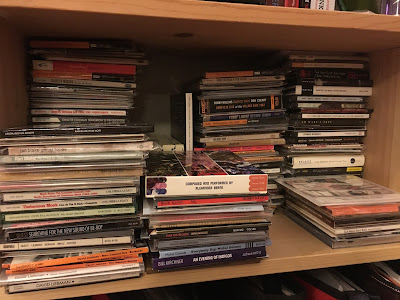Fine and Dandy (Ode)
Alan Broadbent (p) George Chisholm (trpt/flugel) Andy Brown (b) Frank Gibson Jr. (d)
A couple of months ago a friend of mine caught Alan Broadbent playing in New York. Following a conversation with him about the gig, I decided Broadbent was due for a spin. Initially I was going to go with his solo album in the Maybeck Recital Hall series but for whatever reason Fine and Dandy (Ode) was chosen instead.
 Considering his stature, I haven't listened to a bunch of Alan Broadbent – a couple of duo albums with Lee Konitz, his duo with Irene Kral, the solo album mentioned above, and a smattering of others (bits and pieces from a couple of trio albums, some Quartet West) - and I'm yet to hear him live. This album features his line playing more so than his harmonic work (check out the Kral album Where Is Love for some great work as an accompanist). Some words that come to mind are classy, elegant, refined, melodic, swinging, and clarity. I have really enjoyed the fleetness of his playing on the title track - the phrase starting at 1:30 always seems to grab my ear. I also hear the Lennie Tristano influence in his phrasing most clearly on this track. Another favourite is his comping and solo on “We'll Be Together Again” (probably the track during which I scribbled down those half a dozen adjectives) – tasty playing.
Considering his stature, I haven't listened to a bunch of Alan Broadbent – a couple of duo albums with Lee Konitz, his duo with Irene Kral, the solo album mentioned above, and a smattering of others (bits and pieces from a couple of trio albums, some Quartet West) - and I'm yet to hear him live. This album features his line playing more so than his harmonic work (check out the Kral album Where Is Love for some great work as an accompanist). Some words that come to mind are classy, elegant, refined, melodic, swinging, and clarity. I have really enjoyed the fleetness of his playing on the title track - the phrase starting at 1:30 always seems to grab my ear. I also hear the Lennie Tristano influence in his phrasing most clearly on this track. Another favourite is his comping and solo on “We'll Be Together Again” (probably the track during which I scribbled down those half a dozen adjectives) – tasty playing.
I mentioned back in September's post (Space Case Retrospective) that I would be hearing more from the classic pairing of Andy Brown and Frank Gibson Jr. I'm guessing that by the time this album was recorded they would have been playing together for over 20 years. The title track features Brown walking as Gibson solos. It's a texture you don't hear all that often but I like it (from memory I first heard it via Sonny Dallas and Elvin Jones on Lee Konitz's Motion). And I particularly enjoyed his brush work behind Broadbent on “We'll Be Together Again.” I know there's a least two or three albums on the shelf featuring these two but I'll try and share the air(ear)time with the other Kiwi rhythm section stalwarts of Paul Dyne and Roger Sellers and Kevin Haines and Tony Hopkins as well.
Of the quartet, George Chisholm is the player I am least familiar with (I have his album, Lend an Ear, but it's been ages since I listened to it). I feel he is at his best when keeps things concise and melodic as when he gets into double time, his lines can lose focus and the notes lose vitality. The album opener, “Have You Met Miss Jones,” is a pretty good example. He starts off in a melodic mode, from the second chorus he starts interspersing double time lines which for the most part seem a bit forced. However the double time lines on “We'll Be Together Again” flow more naturally. On “Limehouse Blues” he stays clear of the double time and I think it suits him better.
Overall, Fine and Dandy is a clean, solid, all-standards outing. Perhaps it's a little too clean for me, but the playing is high quality playing and it's definitely one for the straight ahead fans to check out.
In 1992 Fine and Dandy won Jazz Album of the Year. Last year I created a list compiling the winners and finalists (here) - it's still a work in progress so drop me a line if you have any correction or information to add (there are a few holes that need filling).










